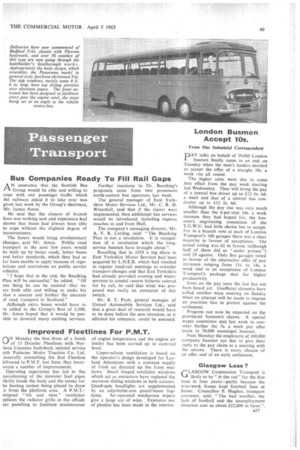Bus Companies Rea dy To Fill Rail Gaps
Page 51

If you've noticed an error in this article please click here to report it so we can fix it.
A N assurance that the Scottish Bus Group would be able and willing to cope with any passenger -traffic which the railways asked it to take over was given last week by the Group's chairman, Mr. James Amos.
He said that the closure of branch lines was nothing new and experience had shown that buses had always been able to cope without the slightest degree of inconvenience.
The future would bring revolutionary changes, said Mr. Amos. Public road transport in the next few years would be built up by better roads, better buses and better standards, which they had so far been unable to apply because of regulations and restrictions on public service vehicles.
"I hope that in the end, the Beeching Plan will be successful," he added. "Of ane thing he can be assured—that we are both able and willing to make his plan a success and further the interests af road transport in Scotland."
Although extra buses would have to ae added to the Group's fleet of 5,500, !qr. Amos hoped that it would be pos ■ ible to dovetail many existing services. Further reactions to Dr. Beeching's proposals came from two prominent north-eastern bus operators last week. The general manager of East Yorkshire Motor Services Ltd., Mr. C. R. H. Wreathall, said that if the report were implemented, then additional bus services would be introduced, including express coaches to and from Hull.
The company's managing director, Mr. A. F. R. Carling, said: "The Beeching Plan is not a revolution. It is recognition of, a revolution which the long. service busmen have brought about ". Recalling that in 1929 a big share in East Yorkshire Motor Services had been acquired by L.N.E.R. which had resulted in regular road/rail meetings to consider transport changes and that East Yorkshire had already provided evening and winter services to coastal resorts hitherto catered for by rail, he said that what was proposed was really an extension of this switch.
Mr. B. T. Pratt, general manager of United Automobile Services Ltd., said that a great deal of research would have to be done before the new situation, as it affected his company, could be assessed.








































































































































